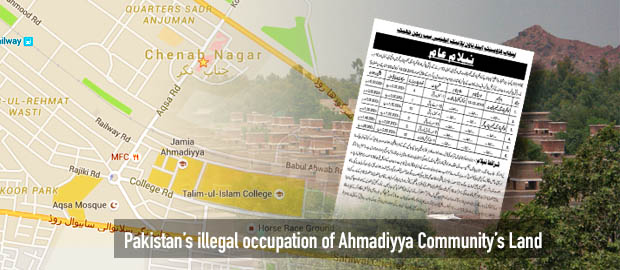The Punjab Housing and Town Planning Agency (PHTPA) on Tuesday auctioned residential and commercial plots in Chiniot district following the placement of an advert that excluded Jamaat-i-Ahmadiyya adherents from the proceedings.
Chenab Nagar (Rabwah), the headquarters of the JA, is situated in the district. The agency’s regional office in Jhang had placed the advertisement in a leading Urdu daily newspaper on March 1. The advertisement for the auction of 25 commercial and residential plots across two low-income housing schemes across the district proscribed Ahmadis from participating in the process.
The auction went ahead as planned on Tuesday with the exception of plots in the Chenab Nagar Lower Income Residential Scheme.
PHTPA Deputy Director Muhammad Saeed, who presided over the auction and placed the advertisement, told the media that the exception had been made due to the scheme’s ownership having been contested at the Supreme Court.
Auction Advertisement in Daily ExpressThe advertisement read: “anyone related to the Qadiani/Ahmadi/ Lahori/ Mirzai sects cannot participate in the Area Development Scheme Muslim Colony, Chenab Nagar.
Every aspirant has to file a duly certified affidavit stating that he/she has no relation to Qadianis/ Ahmadis/ Lahoris.”
It requires the participants to submit an undertaking that they will not sell the property or transfer its ownership to anyone belonging to the JA.
It says that the plot allotment of those found doing so will be cancelled and payment made by them confiscated.
The advertisement also stipulated that anyone interested in participating in the auction had to file another affidavit certifying their unqualified belief in the finality of prophethood.
It referred to a directive issued by the Department of Housing, Urban Development and Public Health Engineering Department (dated July 7, 1976) to justify the prohibition on members of the Ahmadiyya community.
Speaking to the media, JA spokesperson Saleemuddin said his organisation was fighting a court case over the ownership of the land on which the plots were located. He said the land had originally been owned by the JA. Saleemuddin alleged that under pressure from some clerics the government had taken possession of the land in 1976. Following that, he said, an order had been issued asking Ahmadis to stay away from the land.
Saleemuddin said they had moved Lahore High Court (LHC) against the government’s action and obtained a stay order. In spite of the stay order, he claimed, the government had developed plots on a portion of the land and auctioned those. Overtime, Saleemuddin said, residential and commercial plots were developed on around 90 percent of the land and auctioned.
He said LHC had dismissed their petition last year after which the community took the matter to the SC. The appeal was now pending a hearing at the apex court, Saleemuddin said. He said Ahmadis had the right to participate in the auction of any property under the Constitution.
“It is a violation of our fundamental rights to prevent us from participating in the auction,” he said. Saleemuddin said the government was encouraging tolerance and co-existence under its National Action Plan against Terrorism on the one hand, and, discriminating against the JA on account of its religious beliefs, on the other.
Deputy Director Saeed said he was bound to prohibit the community from the auction under the 1976 directive. He said the government’s policy was to not let Ahmadis participate in auction of plots in localities where land was owned by non-Ahmadis.
Human Rights and Minorities’ Affairs Minister Khalil Tahir Sindhu told the media that such advertisements should not be placed. He said the advertisement violated the fundamental rights of citizens that had constitutional sanction. Sindhu said no citizen could be deprived of the right to participate in an auction on the basis of a mere advertisement. The minister said he would strive to ensure that authorities took notice of the development and resolve the matter once and for all.

